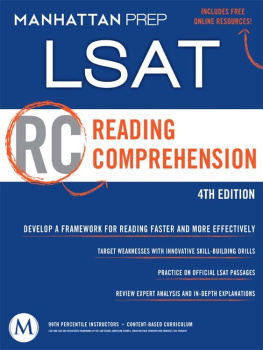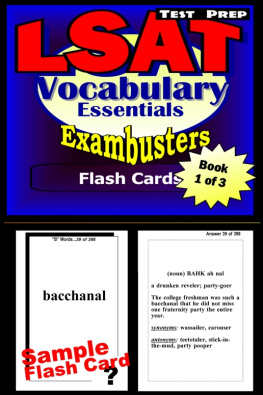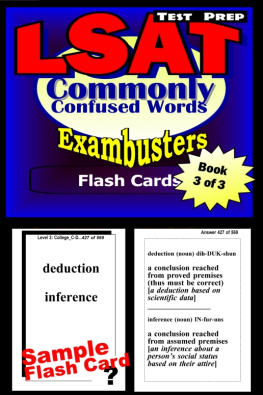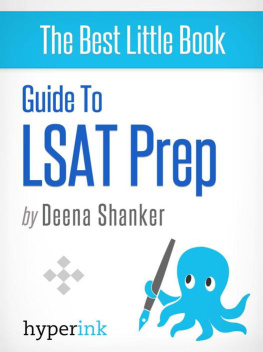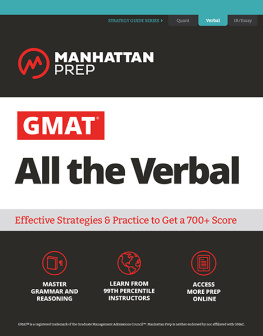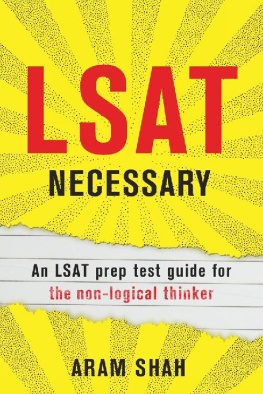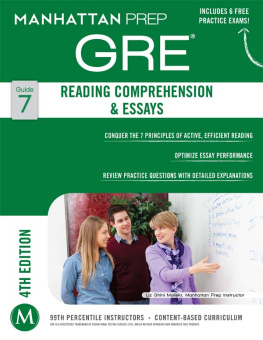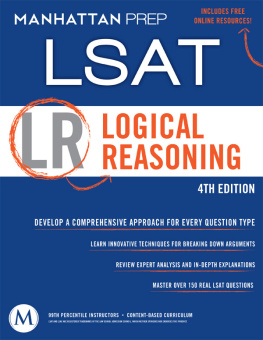MANHATTAN PREP
Reading Comprehension
LSAT Strategy Guide
This guide will teach you an effective technique for mastering LSAT Reading Comprehension and then sharpen your newfound skills with full passages and targeted drills. Learn to change the way you read, tackle the questions effectively, and apply your skills to a wide range of material.

Reading Comprehension LSAT Strategy Guide, 4th Edition
10-digit International Standard Book Number: 1-937707-76-8
13-digit International Standard Book Number: 978-1-937707-76-7
eISBN: 978-1-937707-81-1
Copyright 2014 MG Prep, Inc.
ALL RIGHTS RESERVED. No part of this work may be reproduced or used in any form or by any meansgraphic, electronic, or mechanical, including photocopying, recording, taping, web distributionwithout the prior written permission of the publisher, MG Prep, Inc.
All actual LSAT questions printed within this work are used with the permission of Law School Admission Council, Inc., Box 2000, Newtown, PA 18940, the copyright owner. LSAC does not review or endorse specific test preparation materials or services, and inclusion of licensed LSAT questions within this work does not imply the review or endorsement of LSAC.
Each copyrighted LSAT question that appears in this book is part of a section marked with the exam and exam section from which it was taken (e.g., PrepTest 43, Section 2). Each question is marked with the official question number of the particular question.
Layout Design: Dan McNaney and Cathy Huang
Cover Design: Dan McNaney and Frank Callaghan

INSTRUCTIONAL GUIDE SERIES
Logic Games
(ISBN: 978-1-937707-74-3) | Logical Reasoning
(ISBN: 978-1-937707-75-0) |
Reading Comprehension
(ISBN: 978-1-937707-76-7) |
PRACTICE BOOKS
10 Real LSATs Grouped by Question Type
Practice Book I
(ISBN: 978-1-937707-78-1) | 15 Real, Recent LSATs
Practice Book II
(ISBN: 978-1-937707-39-2) |

March 25, 2014
Dear Student,
Thank you for picking up a copy of LSAT Reading Comprehension. I hope this book provides just the guidance you need to get the most out of your LSAT studies.
As with most accomplishments, there were many people involved in the creation of the book you are holding. First and foremost is Zeke Vanderhoek, the founder of Manhattan Prep. Zeke was a lone tutor in New York when he started the company in 2000. Now, 14 years later, the company has instructors and offices nationwide and contributes to the studies and successes of thousands of LSAT, GMAT, GRE, and SAT students each year.
Our Manhattan Prep Strategy Guides are based on the continuing experiences of our instructors and students. We are particularly indebted to our instructors Mary Adkins, Brian Birdwell, Gilad Edelman, Dmitry Farber, Ian Jorgeson, Matt Sherman, Noah Teitelbaum, Patrick Tyrrell, and Tommy Wallach for their hard work on this volume. Special thanks to Dmitry Farber for providing the guiding vision behind this new edition. Dan McNaney and Cathy Huang provided their design expertise to make the books as user-friendly as possible, and Liz Krisher made sure all the moving pieces came together at just the right time. Beyond providing additions and edits for this book, Chris Ryan and Noah Teitelbaum continue to be the driving force behind all of our curriculum efforts. Their leadership is invaluable. Finally, thank you to all of the Manhattan Prep students who have provided input and feedback over the years. This book wouldn't be half of what it is without your voice.
At Manhattan Prep, we continually aspire to provide the best instructors and resources possible. We hope that you will find our commitment manifest in this book. If you have any questions or comments, please email me at . I'll look forward to reading your comments, and I'll be sure to pass them along to our curriculum team.
Thanks again, and best of luck preparing for the LSAT!
Sincerely,

Dan Gonzalez
President
Manhattan Prep
www.manhattanprep.com/lsat 138 West 25th St., 7th Floor, NY, NY 10001 Tel: 646-254-6480 Fax: 646-514-7425

TABLE of CONTENTS
Chapter 1
of
Reading Comprehension
Part 1: Change How You Read
Reading Comprehension Overview
Why Study Reading Comprehension?
I already know what reading comprehension is. What can this book do for me?
We strongly suspect that you already know how to read! Not only that, but your reading comprehension has probably been tested many times before, starting in elementary school and continuing on through the SAT and now the LSAT.
There is a reason for this: reading comprehension exams are a great way to test an individual's ability to absorb, comprehend, process, and respond to written information in a time-efficient manner. Of course, these are also skills you'll need as a law student and as a lawyer.
It seems to make sense, but is it really possible to accurately quantify a person's level of reading comprehension? Can't we all, by looking at our own lives and experiences, see that our own level of reading comprehension is something that fluctuates from situation to situation?
Let's look at a few scenarios:
- Terry is an electrical engineer. She has been working in a niche industry for years, but it's very easy for her to understand and evaluate articles on engineering concepts that fall outside of her specialty, even when she isn't familiar with the specific terminology involved. She's recently become interested in the stock market and has been trying to read up on it. However, she's having a lot of trouble understanding and organizing the investment advice that she's read in various financial publications.
- Chad is a freshman in high school. He has mastered the art of instant messaging, sending and receiving hundreds of messages a day. He filters and organizes them easily and is able to weave together a cohesive understanding of the lives of his friends. However, when he tries to organize the personalities and events of 18th-century Europe from his history textbook, he's hopelessly lost.
- Jane is an English literature professor and a Luddite. She's finally getting around to using the internet to communicate with her students. She is surprised by the short, abrupt, and casual messages they send to her. She can quickly make sense of complex texts on abstract literary theory, but in this new format she is unable to catch subtleties and has difficulty interpreting the tone of the messages she receives. She tries to write short responses back but invariably ends up sending emails that are too long and take her too much time to put together.
It's easy to see how different types of reading comprehension exams would score Ted, Sally, and Jane very differently. The truth is, none of us has a definable (or quantifiable) level of reading comprehension. Put simply, our reading comprehension ability is highly variable. It depends on many factors, including our familiarity with the subject matter, the manner in which the material is written, our purpose for reading, and our overall interest and focus level.

